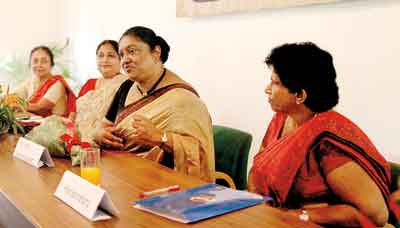More laws needed to protect women: First woman Law College Principal

Indira Samarasinghe P.C. addresses the SLFUW AGM. Pic by Priyantha Wickramaarachchi
In the scenario where a woman was appointed for the first time as Sri Lanka’s Minister of Justice and a woman functioned as Chief Justice not too long ago, the Sri Lanka Law College has its first woman Principal, President’s Counsel Indira Samarasinghe who spoke on “Women and Law” at the 76th AGM of the Sri Lanka Federation of University Women earlier this month. Delivering the keynote address at the AGM chaired by the SLFUW President, Rukshan Dissanayake, Ms. Samarasinghe, herself a member of the SLFUW, spoke not about women who achieved but of the oppressed women of Sri Lanka and of the laws that could help overcome their problems.
Commenting on common problems women confront, she commenced from the girl-child who was symbolic of innocence on whom sexual abuse is perpetrated. From there, she went on to women in various age groups, of young women whose initial phone calls, emails and SMS with warm expressions of love, end up in judicial courts; the harassment undergone by working women, to the rights of women senior citizens for whom a National Welfare Programme should be formulated with pensions, health and other benefits included.
Ms. Samarasinghe, who focused on the legal coverage said legal opportunities should be made available to women to enjoy their rights pointing out that the symbol of Justice was a woman. Lady Justice holds a sword as a symbol of power and strength of justice. She holds a scale for balance and fairness of justice. Her blindfold represents the implementation of justice objectively which specifies that friends or the rich should not be treated favourably.
So, stressing that the Law is equal to all she went on to explain the nature of crimes which could be mental and/or physical.
Having practised in both civil and criminal courts as a legal assistant before she joined the Legal Draftsman’s Department, the new principal said that the civil wrongs committed by married men or women were of different categories with seduction, breach of promise of marriage and adultery being grounds for divorce. These also were related to the rights of the unborn child.
However, offences differed according to Statutes and Customary Laws for marriages, divorces, custody and succession as in the case of Kandyan, Thesavalamai and Muslim Laws. Under these, there is no uniformity in areas such as Age, Consent for Marriage, Registration of Marriage, Relationships for Marriage and Deega and Binna marriages.
Employed women on the other hand are legally covered under several Acts of Parliament and Labour Laws. “The Shop and Office Employees’ Act” covers hours of work, office intervals, ventilation, environment of the place of work and her maternity leave. “The Employment of Women, Young Persons and Child’s Act” covered working of night shifts, age and welfare of the working women. This included young people and children as well, not specifically working women.
However, can the law help when the working woman is harassed by males? Not only by males but by female bosses as well who are often found to be more demanding.Who then is to guard the guards, she asked.
Maternity benefits for working mothers differed between the state and the private sectors with there being no uniformity in the two sectors.
The EPF, ETF and Gratuity as well as the Foreign Employment Bureau, Labour Department and the Free Trade Zone give cover to working women but there should be more safety measures taken of maids working abroad she said. Also laws are needed to arrest the employment of girls who are too young for work.
What of sexual harassment under which fall rape, gang rape, abortion, domestic violence, marital rape, adultery, unnatural offences, homosexuality, bigamy and murder? Children being abused not by strangers but by those close to them?
Ms. Samarasinghe said that reasons for the committing of offences were diverse with the existence of a patriarchal society in Sri Lanka and cultural and economic reasons attributing to the woes of women. She said in addition to good decisions and political representations that could arrest these woes there should be more laws introduced to cover the ever-increasing crimes committed against half of Lankan society.


